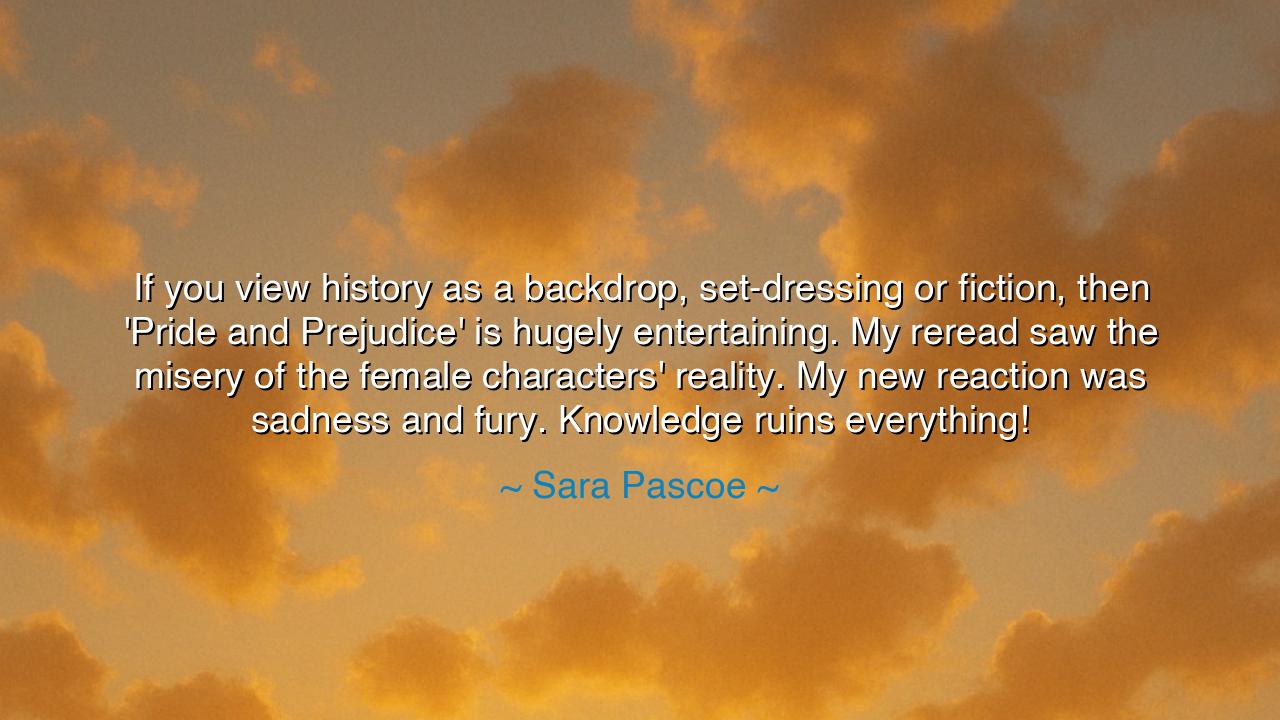
If you view history as a backdrop, set-dressing or fiction, then
If you view history as a backdrop, set-dressing or fiction, then 'Pride and Prejudice' is hugely entertaining. My reread saw the misery of the female characters' reality. My new reaction was sadness and fury. Knowledge ruins everything!






The writer and truth-teller Sara Pascoe declared: “If you view history as a backdrop, set-dressing or fiction, then Pride and Prejudice is hugely entertaining. My reread saw the misery of the female characters’ reality. My new reaction was sadness and fury. Knowledge ruins everything!” In this cry lies a deep awakening: the shift from innocent enjoyment to the painful recognition of injustice woven into the fabric of the past. It is the lament of one who has looked too closely at what others treat as play, and in so doing, has uncovered the chains hidden beneath the silken gowns.
To read without knowledge is to dwell in comfort, seeing only wit, charm, and romance. The reader may laugh with Mr. Bennet, swoon with Elizabeth, and delight in Darcy’s transformation. But with knowledge, the veil is torn. One begins to see not only the story, but the cage in which the women lived. Daughters without fortune were doomed to marry for survival, stripped of true independence. Their lives were not comedy, but constraint; not light entertainment, but the grinding pressure of a world that measured them by dowry and obedience. Thus does knowledge bring both illumination and sorrow.
This paradox is ancient. In the tale of Oedipus, the king sought to uncover the truth, only to find despair and blindness at its end. The chorus wept: “How terrible is wisdom when it brings no joy.” So too in Pascoe’s cry: “Knowledge ruins everything.” Yet is it truly ruin, or is it liberation? For while innocence may bring pleasure, only awareness can bring justice. The world cannot be healed by those who refuse to see its wounds.
Consider the story of the suffragettes. Many in their day laughed at them, ridiculing their cries for equality. To most, women’s subjugation was simply the “way of things,” unnoticed, unchallenged. But those who gained knowledge of the truth—the knowledge that half of humanity was denied voice and power—were seized with “sadness and fury.” They could no longer enjoy the backdrop of their society without protest. And though their knowledge cost them comfort, it also gave birth to change.
Pascoe’s words remind us that art, literature, and history are not lifeless entertainment but mirrors of lived reality. When we read with innocence, we enjoy the performance; when we read with awareness, we see the hidden pain. The laughter is harder, the romance less sweet—but the truth more urgent. Thus the cry, “Knowledge ruins everything!” is not a rejection of wisdom, but a lament for the innocence one can never return to after seeing the chains of others.
The lesson is this: do not fear when knowledge steals your comfort. Let it. For comfort sustains ignorance, but discomfort gives birth to transformation. If you feel sorrow at injustice, let that sorrow fuel your resolve. If you feel fury at cruelty, let that fury move you to action. To remain blind may feel easier, but to awaken is to live more truly, even when the truth wounds.
In your own life, approach books, films, and history not only for amusement, but for truth. Ask: Whose story is not being told? Whose suffering is being hidden? Where do I see romance, but they endured necessity? Where do I see comedy, but they endured tragedy? In this way, you train your heart to see beyond the backdrop, and to honor those whose struggles have been erased.
Thus let Pascoe’s lament be heard as both warning and wisdom: knowledge ruins everything—yes—but only illusions, only false comfort, only the shallow joys of ignorance. What it builds instead is vision, justice, and compassion. And these are not ruins, but foundations for a world more honest, and more free.






AAdministratorAdministrator
Welcome, honored guests. Please leave a comment, we will respond soon